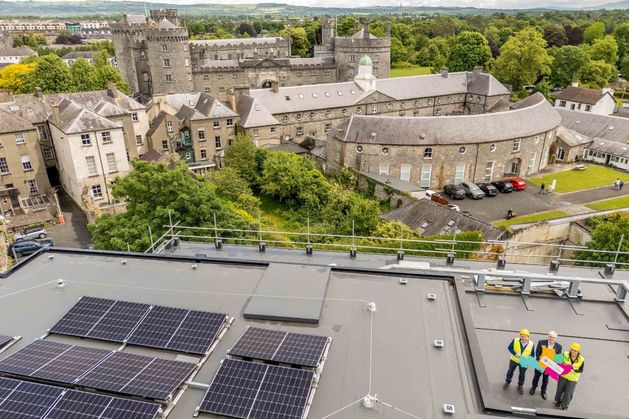Summary
The South East Energy Agency (SEEA) has partnered with the boutique hotel Pembroke Kilkenny to complete a five-year 524,422 energy upgrade. The sustainable project reduced carbon by 107 tonnes annually, moving the hotel closer to its goal of becoming carbon-neutral.
Source: Independent.ie on MSN.com

AI News Q&A (Free Content)
Q1: What were the main outcomes of the partnership between the South East Energy Agency and the Pembroke Kilkenny hotel?
A1: The partnership resulted in a significant reduction in carbon emissions by 107 tonnes annually, with an annual energy saving of 477,316 kWh, which is enough to power 130 average Irish homes for a year. The project also achieved cost savings of €36,090 annually and received grants of €157,326. Such sustainable measures are equivalent to planting 1,610 trees, showcasing the project's environmental impact.
Q2: How does the Pembroke Kilkenny plan to achieve its carbon-neutral goals through this partnership?
A2: The Pembroke Kilkenny aims to achieve its carbon-neutral goals by implementing comprehensive energy efficiency upgrades in collaboration with the South East Energy Agency. These upgrades include measures that significantly reduce energy consumption and carbon emissions, moving the hotel closer to its sustainability targets.
Q3: What are the broader implications of this partnership for local businesses and communities in Ireland?
A3: This partnership exemplifies how local businesses can significantly contribute to national climate goals, such as Ireland's 2030 targets, by adopting sustainable practices. It serves as a model for other businesses, demonstrating that with ambition and innovation, substantial environmental and economic benefits can be achieved, encouraging a collective effort towards sustainability.
Q4: What role did government-backed grants play in the Pembroke Kilkenny's energy upgrade project?
A4: Government-backed grants played a crucial role by providing financial support amounting to €157,326, managed by the South East Energy Agency. These grants made the energy upgrade project more feasible and attractive, highlighting the importance of government assistance in promoting sustainable practices in the commercial sector.
Q5: How does the energy upgrade at Pembroke Kilkenny contribute to the Renewable Energy Directive goals?
A5: The Pembroke Kilkenny's energy upgrade contributes to the Renewable Energy Directive goals by implementing energy-efficient measures that align with the directive's focus on increasing the use of renewable energy sources and reducing carbon emissions, thereby supporting EU's broader climate and energy targets.
Q6: What innovative energy-saving technologies were employed in the Pembroke Kilkenny project?
A6: The Pembroke Kilkenny project utilized various energy-saving technologies, including advanced energy management systems and high-efficiency equipment, which collectively contributed to the substantial reduction in energy use and carbon emissions. These technologies represent cutting-edge solutions in the field of sustainable building management.
Q7: What are the expected long-term benefits of the energy upgrade for the Pembroke Kilkenny hotel?
A7: The long-term benefits include sustained reductions in operational costs, enhanced energy efficiency, and a strengthened commitment to environmental stewardship. These improvements not only support the hotel's carbon-neutral ambitions but also enhance its reputation as a leader in sustainability within the hospitality industry.


